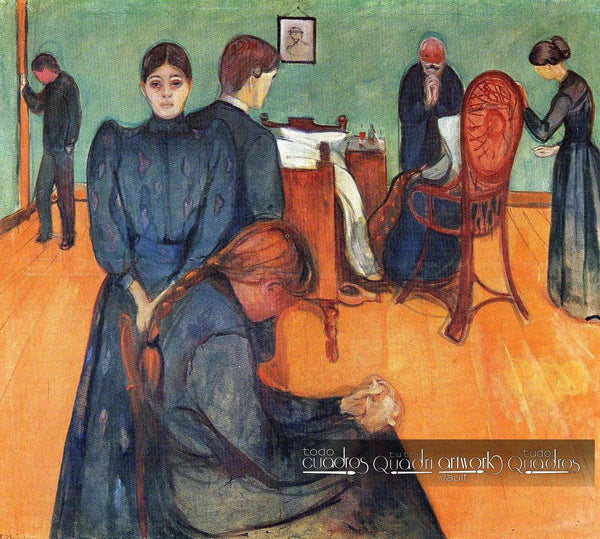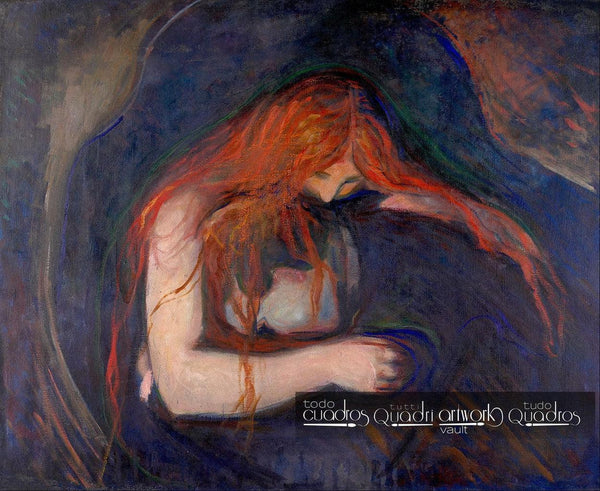Edvard Munch
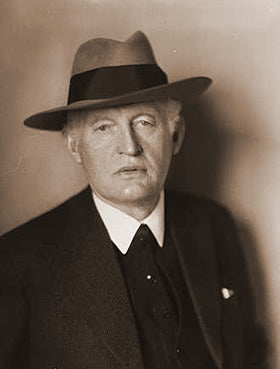
| Name: | Edvard Munch. |
|---|---|
| Year of birth: | 1863, Hedmark, Norway. |
| Year of death: | 1944, Oslo, Norway. |
| Style: | Expressionism. |
Eccentric and innovative Norwegian painter. Throughout his career, he aimed to capture the faces of human psychology, representing "the soul" in his own words.
At 18, he abandoned his engineering studies where in the first year, he had learned the basics of technical drawing. His great dream was to become a full-time painter, which triggered all sorts of questions in his family and social environment.
He is considered one of the greats of expressionism and a precursor of modernism. Although his works do not demonstrate stunning technical skill, he thrives in symbolism and conceptual art.
Paintings by Munch
Edvard Munch's paintings and engravings follow a very marked thematic line, often related to depression and an extremely negative view of existence. Nevertheless, he is considered a genius for his aesthetic proposal and personality.
-
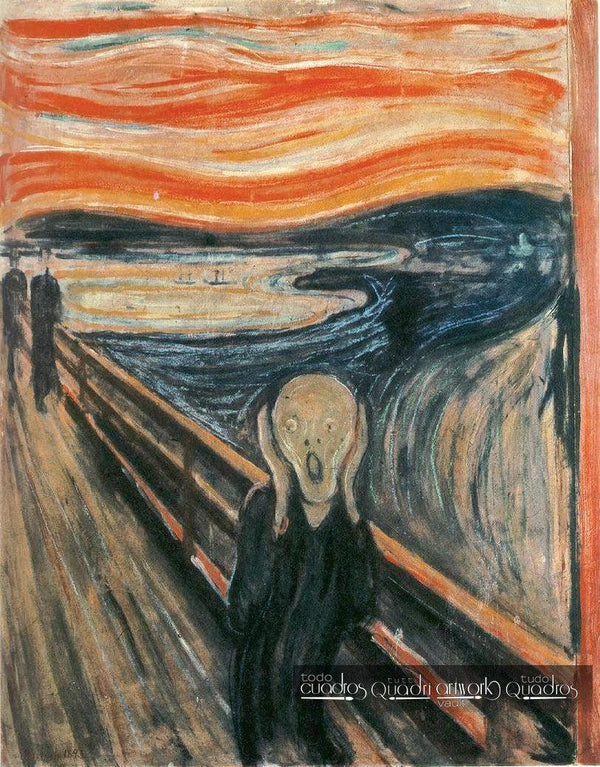
Author: Edvard MunchStyle: ExpressionismOriginal title (German): Der Schrei der NaturIn Norwegian: SkrikTitle (English): The ScreamType: PaintingTechnique: Tempera, pastel, and crayons.Support: CardboardYear: 1893Located in: The National Gallery of Norway
Throughout his career, he painted at least 4 versions of this same composition, the one shown in this image being one of the most widely known. Its great success is largely due to the impact it achieves, with the entire image powerfully exuding sensations of fear and impending calamity.
The inspiration for "The Scream" came from a rather mundane experience, during which the painter was taking a walk. He stopped and had a kind of vision where he felt that nature itself was transmitting its anguish to him.
-
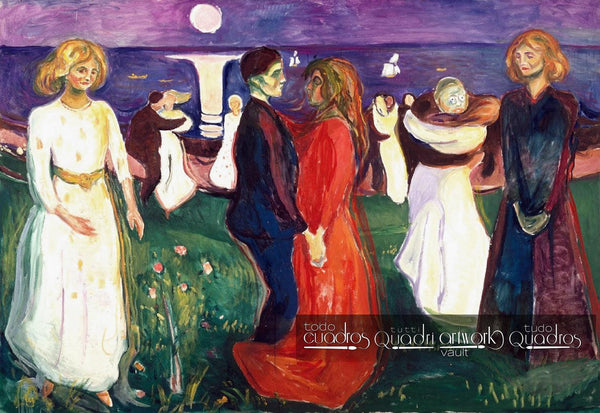
Author: Edvard MunchStyle: Symbolism and ExpressionismOriginal title (Norwegian): Livets dansTitle (English): The Dance of LifeType: PaintingTechnique: OilSupport: CanvasYear: 1900Located at: The National Museum of Art, Architecture and Design (Oslo).
A work full of symbols, where the author conveys a multitude of messages, which have been the subject of extensive interpretations by experts.
The most evident representations are: the transition from childhood to old age, shown by the three women from left to right; the moon over the two central young people signifies the passionate character of the canvas; the girl in white, representing innocence, looks to the future (to the right) with an excited gesture; the young woman in the middle looks at her man and is committed to mutual surrender; and the oldest one looks at the past (to the left) with a gesture of bitterness.
25 years later, the artist would paint the same design in a very similar version.
-
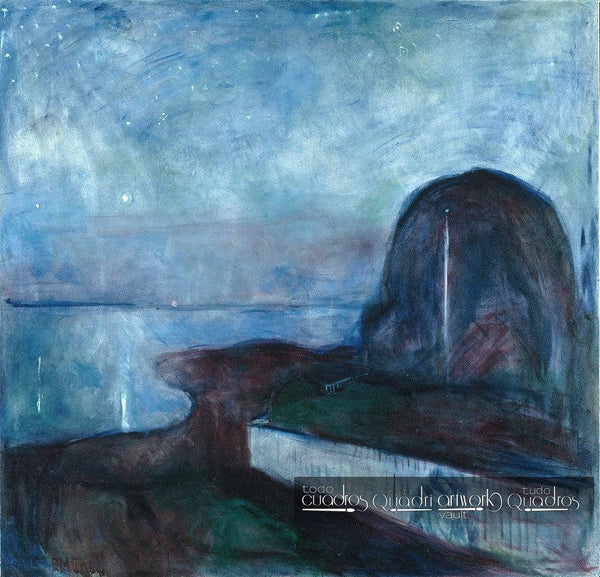
Author: Edvard MunchStyle: ExpressionismTitle (English): Starry NightType: PaintingTechnique: OilSupport: CanvasYear: 1893Located at: J. Paul Getty Museum, Los Angeles, USA.
It shows the view from a window, on a summer night, from a hotel in the small coastal town of Åsgårdstrand, Norway.
Far from attempting a realistic view of the landscape, the artist's intention was to capture feelings of melancholy, and to establish a contrast between light and shadow, accompanied by the texture of the work itself. The painting is very dense in the shadows and the canvas is almost bare in the brighter parts.
-
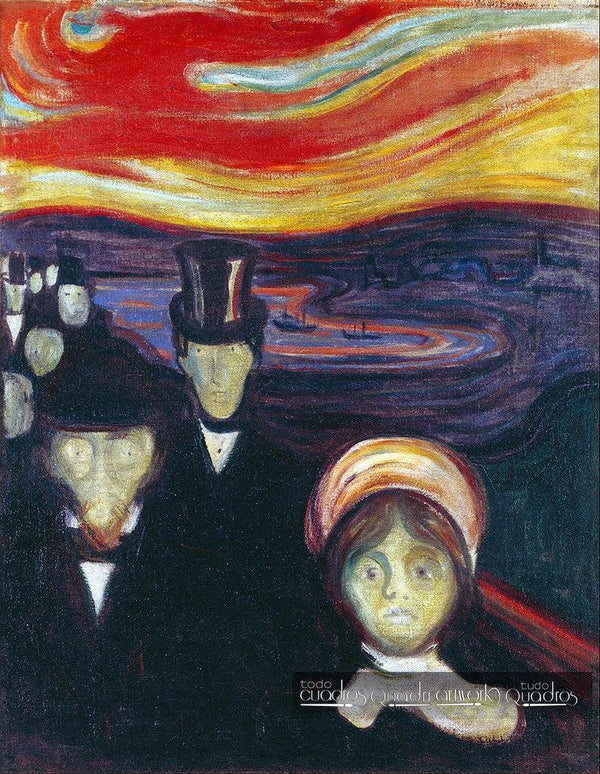
Author: Edvard MunchStyle: ExpressionismOriginal title (Norwegian): AngstTitle (English): AnxietyType: PaintingTechnique: OilSupport: CanvasYear: 1894
In an environment very similar to "The Scream", this work shows 3 main characters with greenish faces, projecting a sense of anxiety, unease, and depression.
-
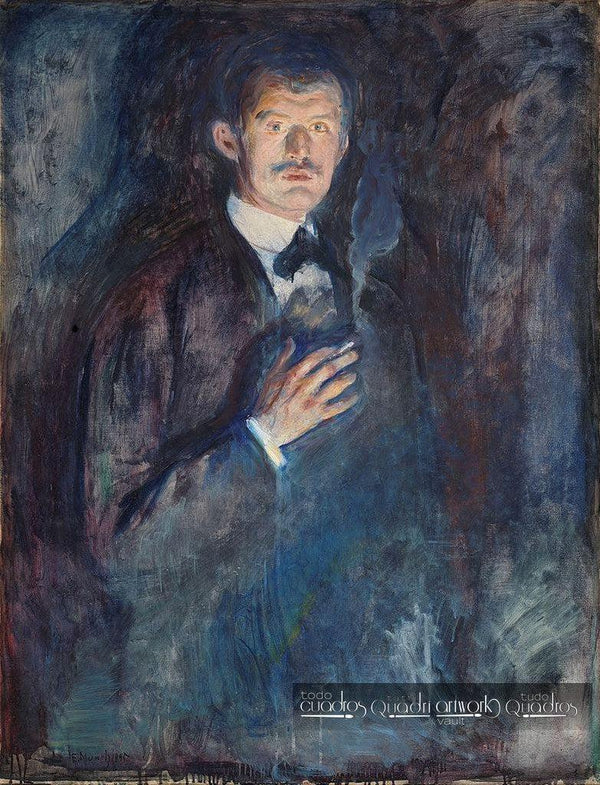
Author: Edvard MunchGenre: PortraitOriginal title: Selvportrett med sigarettTitle (English): Self-Portrait with Burning CigaretteType: PaintingTechnique: OilSupport: CanvasYear: 1895Located at: The National Gallery of Norway
This is a high-quality portrait, as few others throughout his career, where he shows himself smoking, with the lower half of his body blurred by the smoke.
The facial expression is one of contemplation and bewilderment, echoing his own words: "Disease and madness were the black angels that stood at my cradle...".
-
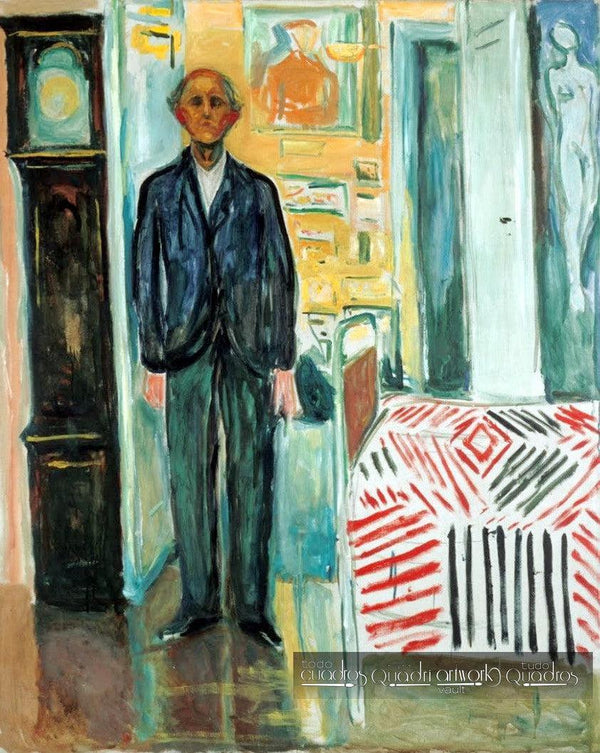
Author: Edvard MunchStyle: Modernism and SymbolismTitle (English): Self-Portrait. Between the Clock and the BedType: PaintingTechnique: OilSupport: CanvasYear: circa 1943
This is one of Munch's main paintings, where he portrays himself in a manifest state of old age and loneliness
Without showing any emotion. The only thing he waits for is death, which looms over him symbolically, situated between the clock and the bed: the former a symbol of the little time he has left and the latter a symbol of the inevitable outcome.
-
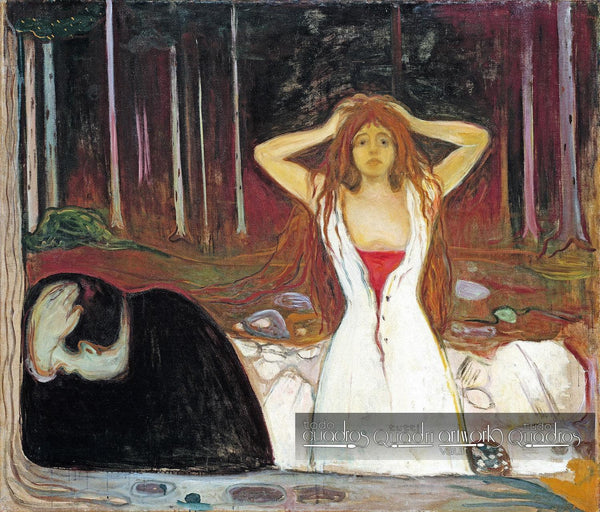
Author: Edvard MunchStyle: European SymbolismAlso known as: AshesType: PaintingTechnique: OilSupport: CanvasYear: 1894Located at: The National Gallery of Norway
Tells a story through images, where the title "Ashes" signifies what remains between lovers after the fire of passion ends.
The girl brings her hands to her head after having had an intimate encounter with the man appearing in the bottom left corner. The forest setting represents a hidden relationship that has no place. She is half-dressed and with a gesture of regret, while he hides his face in a manner that seems like shame.
-
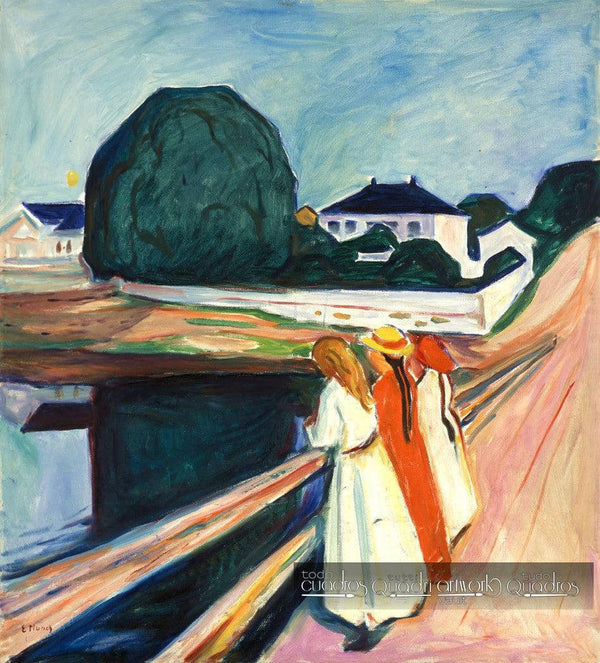
Author: Edvard MunchStyle: ExpressionismAlso known as: Girls on the BridgeType: PaintingTechnique: OilMedium: CanvasYear: 1927
The artist was almost obsessed with this scene, painting different versions of it over more than 30 years (the first in 1901). The present one is considered one of the most outstanding, the painter made a simile of the original work, after experimenting with changes in the landscape dozens of times.
-
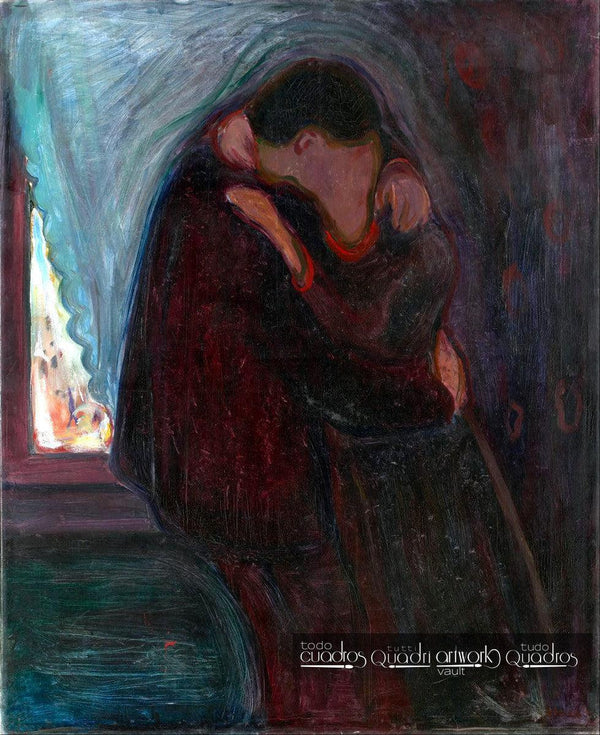
Author: Edvard MunchStyle: SymbolismTitle (English): The KissType: PaintingTechnique: OilSupport: CanvasYear: 1897
It depicts a man and a woman kissing, embraced. The artist uses the technique of free brushstroke with a heavy texture to convey a sense of movement, not only in the figures but throughout the entire pictorial space. It's also noted that the lovers are in a room with the curtains closed, letting in some street light through the uncovered corner of the window. The colors used are mainly cool: blues, greens, blacks, and dark reds.
-
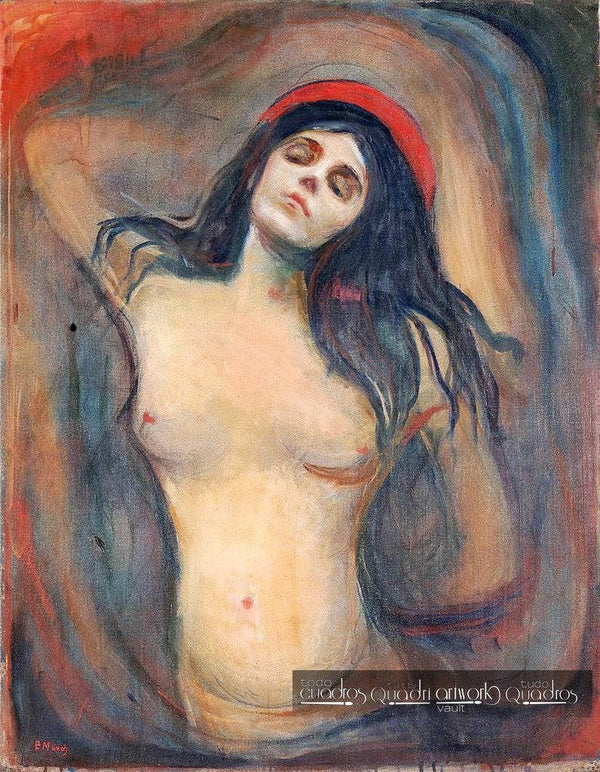
Author: Edvard MunchGenre: PortraitType: PaintingTechnique: OilSupport: CanvasYear: circa 1895Located in: The National Gallery of Norway
The same design was painted 5 times in oil and engraved once on a lithographic plate, from which several color lithographs were printed. One of these was sold at auction for 1.25 million British pounds.
Art critics and experts do not agree on a single interpretation of this motif, however, they concur on some general lines: the sexual character, the prominence of the woman over the man, and the close tie between love and death.
Order it in the section of Munch's oil paintings
Related famous painters:
↑Back to top

